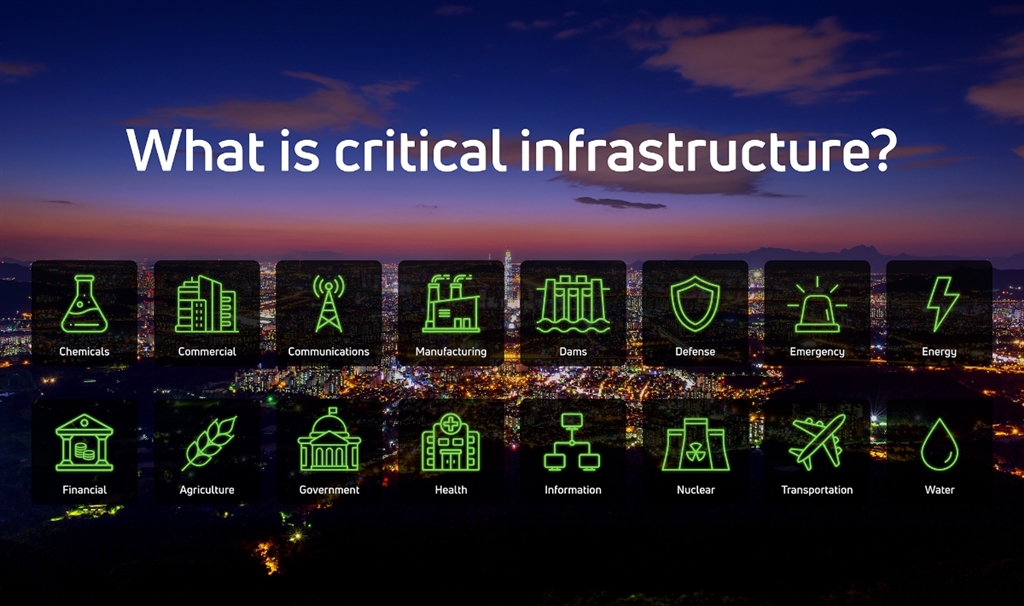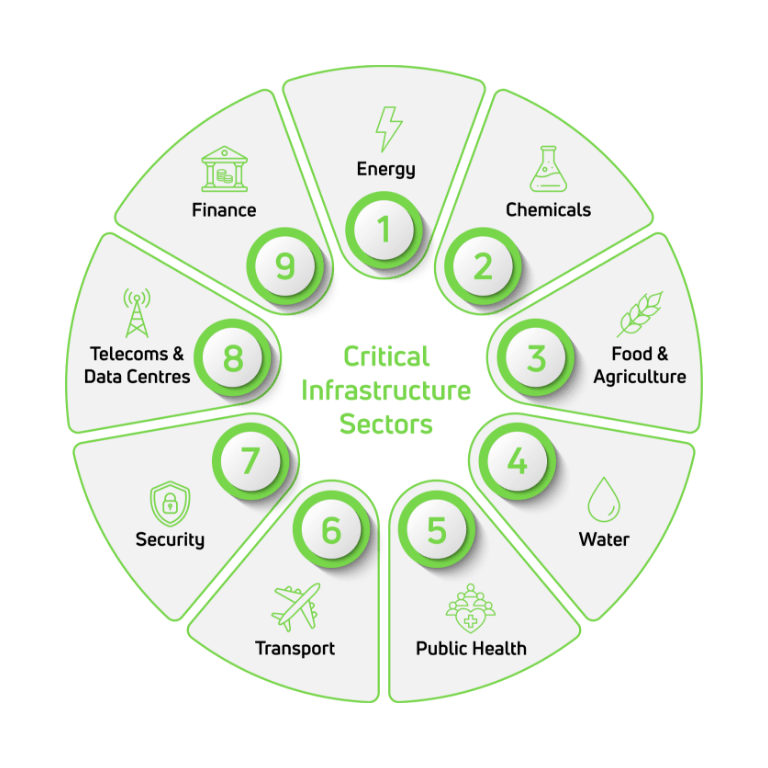Critical Infrastructure
Page EnquiryHere are key reasons why cyber security is critically important for these sectors:
Preventing Disruption of Essential Services
Critical infrastructure provides essential services that society relies on daily. A cyber attack on systems like power grids, water supply networks or transportation systems could cause massive disruptions, leading to potential economic and social chaos.
Protecting National Security
Many critical infrastructure systems are tied to national security. An attack on these systems could weaken a nation’s defence capabilities or expose sensitive governmental data. For instance, hacking into defence networks or communications systems can lead to espionage, sabotage or even coordinated military attacks.
Preventing Economic Losses
Cyber attacks can lead to major financial losses by disrupting industries and services that form the backbone of the economy. The inability to access basic utilities, make financial transactions or transport goods can result in significant economic downturns also the cost of responding to and recovering from such attacks is often enormous.
Mitigating Public Safety Risks
Many critical infrastructure sectors, such as healthcare, energy and transportation, have a direct impact on public safety. A cyber attack could compromise the safety of individuals. For example, hacking into a healthcare system could lead to deaths, while compromising a transportation system could cause mass serious accidents.
Securing Data Integrity
Critical infrastructure relies heavily on data. Whether it’s patient records in healthcare, financial data in banking or operational data in energy grids, protecting this data from cyber attacks ensures its integrity and confidentiality. A breach could result in misinformation, data manipulation or the leaking of sensitive information.
Addressing Emerging Threats
As critical infrastructure becomes more digitised and interconnected, the threat landscape expands. Cyber security helps to address emerging threats such as ransomware attacks, state-sponsored cyber espionage and sophisticated hacking techniques targeting interconnected systems (like industrial control systems).
Ensuring Trust in Public Systems
Public trust in critical services is essential for the proper functioning of society. A breach in one sector can erode trust in the entire system. Robust cyber security helps ensure that public systems remain reliable, efficient and secure from manipulation.

Critical infrastructure consists of key sectors and systems that are essential for the functioning of a society, economy, and public safety.
These sectors can vary slightly depending on the country but generally, they include the following:
Power Generation and Distribution: Includes electric power plants, renewable energy sources (solar, wind, hydro), and electrical grids.
Oil and Gas: Refineries, pipelines, and storage facilities that are vital for fuel supply.
Water Treatment Facilities: Systems that provide clean, potable water to the public.
Wastewater Treatment: Facilities that handle sewage and other waste products, ensuring clean and safe environmental conditions.
Aviation: Airports, air traffic control systems, and airlines.
Railways: Freight and passenger train networks.
Roads and Highways: Major roads, bridges, and tunnels.
Maritime: Ports, shipping lanes, and cargo shipping infrastructure.
Hospitals and Clinics: Medical care facilities.
Pharmaceuticals and Medical Supplies: Manufacturers and suppliers of drugs, vaccines, and medical equipment.
Public Health Networks: Systems monitoring and managing public health crises, such as pandemics.
Banks and Payment Systems: Institutions that manage money transfers, investments, and financial transactions.
Stock Exchanges: Marketplaces for trading stocks and securities.
Telecommunication Networks: Internet service providers, telephone systems, and satellite communications.
Broadcasting Systems: Radio, television, and emergency broadcast networks.
Food Production and Distribution: Farms, food processing plants, and distribution networks (including grocery stores and supermarkets).
Agriculture: Livestock and crop production that sustains the food supply chain.
Buildings: Administrative buildings, courts, and other government-related infrastructure.
Defence and Military: National defence buildings, including military bases and weapons systems.
Law Enforcement: Police departments and criminal justice systems.
Fire and Rescue: Fire departments and emergency medical services (EMS).
Disaster Response: Systems and organizations for responding to natural disasters or public emergencies.
Data Centers and Cloud Services: Systems that manage and store data for businesses, governments, and individuals.
Cybersecurity Infrastructure: Networks that protect sensitive information from cyber threats.
Chemical Manufacturing: Plants that produce essential chemicals for various industries.
Hazardous Materials: Systems for the storage, transport, and disposal of hazardous substances.
Factories and Production Lines: Manufacturing of materials essential to other critical sectors, such as steel, electronics, and machinery.
Nuclear Power Plants: Facilities generating nuclear energy.
Nuclear Waste Management: Safe handling, storage, and disposal of radioactive materials.
Water Retention and Flood Control: Dams that control water flow, prevent flooding, and provide hydroelectric power.
Military Equipment: Companies and facilities that develop and produce defence-related technologies, weapons, and systems for national security.
Satellites and Space Stations: Systems that manage communication, weather monitoring, and national security surveillance.
Within the critical infrastructure sectors, a lot of these sectors are both heavily connected and interdependent, meaning that any disruption within one sector can often quickly cascade to and impact mutiple other critical industry infrastructure sectors with potentially serious ramifications.
For example, a cyber attack on the energy sector would be devastating, this would have serious knock on affects in various industries like healthcare facilities, transportation systems, data centers and telecommunications, which is why cyber security is such a critical aspect of maintaining the safety, intergrity and functionality of critical infrastructure companies.
LoughTec specialise in critical infrastructure cyber security for both Information Technology (IT) and Operational Technology (OT) Cyber Security requirements and have demonstrable experience in creating bespoke complex and ultra secure cyber security solutions.
Reach out to LoughTec today on the below enquiry form to find out more.








